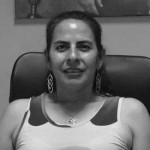
Fanny Mariuxi Cobos Romero (’01, Ecuador)
“I do what I love, I support the people with the greatest needs, and most importantly I have been able to return to my province and my country to share with my people everything I learned at EARTH,” says Fanny, who is from the province of Zamora Chinchipe in the southeastern end of the Amazon Basin in Ecuador.
After graduating from EARTH, Fanny returned to her province and worked in a variety of roles in both the public and private sector. She managed solid waste for the Municipality of Zamora, led environmental restoration for mining companies, and, through the Fidase Foundation, she led the creation of the Association of Small-Scale Exporters of Organic Coffee and Cacao in the county of Centinela del Condor. From the Ministry of Agriculture, Livestock and Fisheries she was responsible for a project in her province to reactive coffee and cacao farming, and through a role with the Autonomous Government of Panguintza, she led a program to support small-scale farmers with technical assistance and the development of integrated farm plans.
Currently, Fanny is the Provincial Director of the Ministry of Agriculture, Livestock, and Fisheries for Zamora Chinchipe. Leading a team of 65 employees, Fanny is responsible for implementing extension programs, creating and promoting development projects, and promoting extension services among agricultural organizations and farmers, in addition to other management responsibilities. Fanny and her team directly benefit 2,300 farmers annually by providing inputs, small farm animals, and technical assistance.
“My biggest motivation,” says Fanny, “is that we are directly meeting the needs of small farmers.”
It is this humanitarian focus that Fanny believes sets EARTH graduates apart. Beyond the technical knowledge, the emphasis at EARTH on developing ethical and moral values, she says, produces “good leaders.”
“The professional and moral ethics instilled in us by EARTH University has been and continues to be a fundamental pillar in being able to support agricultural and social development in my province,” she affirms.
Fanny emphasizes that the scholarship she received from the W.K. Kellogg Foundation to attend EARTH was the single biggest factor in becoming who she is now as both a person and as a professional. She adds that more EARTH graduates are needed in her part of Ecuador.
“My province is a place where there are many forests and much biodiversity, which we have to protect by promoting sustainable agriculture.”












